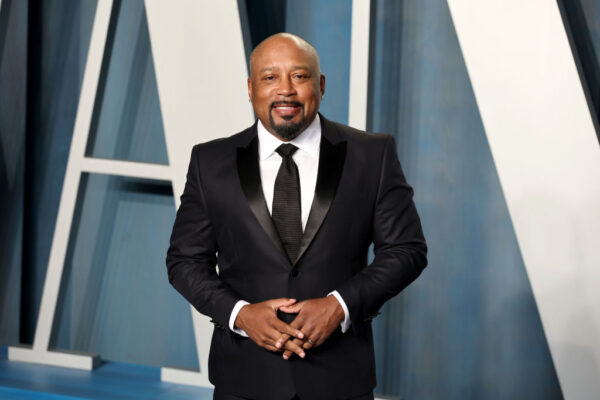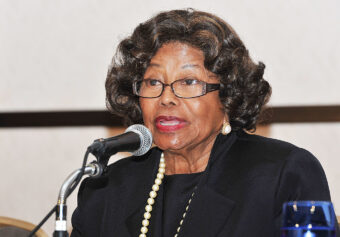Daymond John started out as an entrepreneur and today he helps other business owners kick off their dreams a a shark on the popular startup pitch competition show “Shark Tank.” Along the way, John has learned some valuable lessons about how to be a successful businessperson.
John, 53, had an entrepreneurial spirit early on.

The Founding of FUBU
John had just turned 20 in 1992 when he realized fashion was his passion and he wanted to create a unique clothing line targeting young people like himself. He named his brand FUBU (For Us By Us). And the beginnings were humble. He sewed pieces in his mother’s house in Hollis, Queens, New York City. He gave away samples and sold small amounts of items until he started a local buzz that grew and grew. Things were moving so fast, John and his mother had to mortgage their house for $100,000 to generate start-up capital and to fill orders. John also recruited friends Carlton E. Brown, J. Alexander Martin and Keith Perrin.
At the time, he also held down a full-time job at Red Lobster, working on the FUBU business in between shifts. Finally, the hip-hop world took note of FUBU and the brand gained global attention. At one point, it earned over $6 billion in global sales.
In 2009, John was tapped to join the cast of ABC’s new reality business show “Shark Tank.” “Shark Tank” completed its 13th season in May 2022. During the show’s run, as of May 12, 2017, John had invested $8,567,000 of his own money in “Shark Tank” companies. Among his favorite and most successful investments on record by 2015 were Al “Bubba” Baker’s boneless ribs and Bombas socks.
John, who has a net worth of $350 million, later founded the Shark Group, a brand management and consulting firm.
Here are five success lessons from John.
1.Failures are Lessons
FUBU wasn’t John’s first venture. First, he tried buying, fixing and flipping cars. But the venture tanked. Next, he started a transportation company.
“It was like a carpool in our neighborhoods,” Daymond explained to Trainual. “We would drive vans up and down the bus stops and pick people up for a $1 apiece to ride from Queens to Rockaway.”
While the carpool business did well, it wasn’t actually legal. John didn’t have the necessary taxi license from the Department of Transportation, a license that was hard to obtain and expensive. John ended his business when he was fined $3,000 for running a van system without a license.
Finally came the FUBU idea, and that was it.
“You can’t let your ego get in the way of you sometimes. You have to start hacking yourself. Don’t take yourself too seriously and see where you fall short,” John advised.
2. Don’t Be Tainted By Early Money
Fast money isn’t always the best. The best business mentors “tell you not to take in finance too soon,” John told CNBC.
If startups accept money too early in their venture, they will be pressured to deliver to investors. This can take the founder off the focus of building their business.
“Cut most of the other things you’re doing out of the way,” John advised, “and focus.”
3. Deliver What Customers Want
When John first launched FUBU, the target customer was “the bigger-built Black men,” John said.
“I realized the really big guys had no stylish clothes to wear. They had to go to Rochester Big & Tall and get a white or black shirt. Or they had to get something custom made,” John explained. So he not only offered regular-sized jerseys, he included sizes 5X and 6X. Then he went to where his target customer was.
Instead of freebies of FUBU for celebrities, John handed out shirts to nightclub bouncers, who tend to be larger-sized. In the process, he not only hit his target customer, he got to show off his clothes to the celebs who would go to the club — and, of course, notice the bouncers wearing FUBU.
“This is all about making a group of people — no matter how small or literally big — feel special,” John recalled.
4. Business Owners Shouldn’t Let Others Define Their Brands
“I knew my customer, but I didn’t know my business,” said John, whose goal was to make FUBU a global brand. “I started to hone in on my pricing, my colors, my deliverables, and my sizing. And that’s how I started to expand the brand.”
He fine-tuned his business, eliminating everything that was not on brand. When his brand was clearly defined, customers could relate to it and depended on FUBU to always deliver a certain style. Being successful domestically allows John to expand worldwide and meet his global goals.
“[The] 2 to 5 words [that define your brand] need to be throughout everything: how you dress, how you walk, how you talk, what people say about you when you’re not in the room, and what you say when you’re on social media because that’s where people are looking at you,” John told CBNC.
5. Have a Backup CEO
According to John, a company’s first permanent hire should do the same job as the owner, Trainual reported. This way, Daymond explained, “you can easily know whether [the first employee is] doing a good job or a better job, and you can start focusing on some of the other areas and the other hires.”




